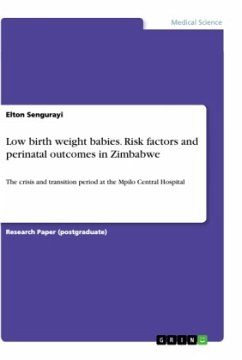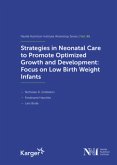Research Paper (postgraduate) from the year 2013 in the subject Medicine - Pediatrics, grade: 1, , language: English, abstract: The purpose of our study is to evaluate the role of several maternal factors that would contribute to low birth weight (LBW) and to what extend they would affect the birth weight. The main objectives is to look at the LBW incidence, risk factors and immediate perinatal outcomes from 2008-2009 in Zimbabwe and make a comparison with normal weight babies. In addition, it tries to illustrate any relationship between LBW and the several suspected contributing factors to immediate outcome (fetal condition on delivery).Low birth weight (LBW) has been defined by the World Health Organization (WHO) as weight at birth less than 2 500 grams (5.5 pounds). This practical cut-off for international comparison is based on epidemiological observations that infants weighing less than 2 500 g are approximately 20 times more likely to die than heavier babies. A birth weightbelow 2 500 g contributes to a range of poor health outcomes and this is more common in developing than developed countries.According to the 2002 census, Zimbabwe has 11.6 million people. Infant mortality rates (IMR) climbed from 53 to 81 deaths per 1000 from 1960 to 2008. Also 2/3 of childhood deaths occur during infancy, with more than a third taking place during the 1st month of life. Estimates of unemployment rate are around 85-90%. As of 2009, 1.2 million Zimbabweans live with HIV. By end of 2008 the health system had more or less collapsed. Three of Zimbabwe's four major hospitals (Mpilo was the exception) had shut down, along with University of Zimbabwe's Medical School.
Hinweis: Dieser Artikel kann nur an eine deutsche Lieferadresse ausgeliefert werden.
Hinweis: Dieser Artikel kann nur an eine deutsche Lieferadresse ausgeliefert werden.








